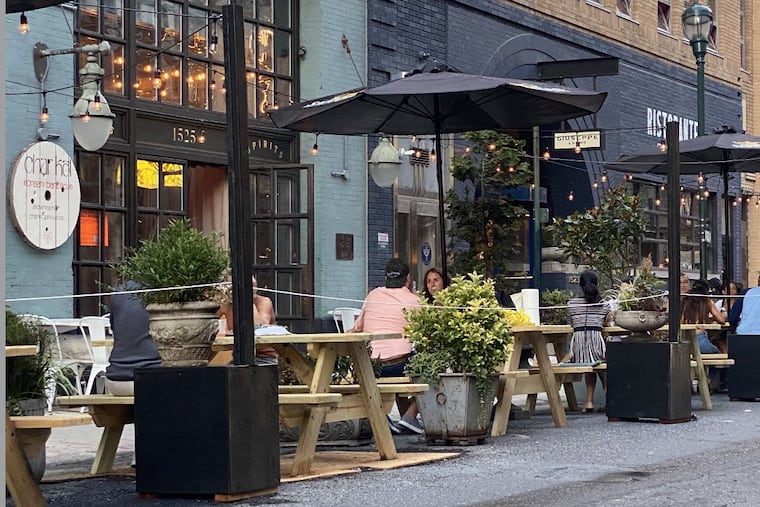Char Kol, a pop-up Korean restaurant, accused of cultural appropriation, faces protests
Michael Schulson and Nina Tinari are accused of disrespecting Korean cuisine and culture for personal gain. They have made changes to their Center City pop-up restaurant.

A restaurant that uses paper-lantern lighting, Sapporo Beer-branded umbrellas, and drinks with such names as Silk Road and Chong-Li may be a mix of Asian influences.
But because they described the theme of Char Kol as “Korean barbecue,” restaurateurs Michael Schulson and Nina Tinari are being accused of cultural appropriation for their new pop-up restaurant — in this case, white entrepreneurs disrespecting Korean cuisine by using the culture for personal gain.
Schulson, through his spokesperson, said he and his staff did not intend Char Kol to be authentically Korean, “rather an appreciation of the cuisine.” During the pandemic, with business sinking, his team was charged with thinking about what cuisine could work. Schulson noted that his company’s head chef, Matt Rudofker, who is white, had spent nearly a decade working with Korean American chef David Chang and that his staff enjoyed eating Korean BBQ — grilled meats over charcoal accompanied by side dishes known as banchan.
Protests began online shortly after the Aug. 5 opening. On Aug. 9, Hemi Park, a Korean American former restaurant worker from South Philadelphia, stood outside Char Kol at 1523 Sansom St. — which had been closed at the time — holding a sign whose message began with an obscenity directed at Schulson’s knowledge of Korean food and concluding, “My culture isn’t your accessory.”
Park, who said she was offended by the restaurant’s drink names and Japanese decorations, posted her photo on Instagram the next day, sparking dozens of comments and spirited debate.
Schulson recently removed the lanterns and renamed the drinks, saying he did not intend to offend anyone. The Japanese gyoza was taken off the menu. There are plans to keep the restaurant open into the fall.
The critics accuse the couple of attempting to profit from Korean cuisine.
» READ MORE: After unrest, these restaurants rebuilt in solidarity
With most of the region’s Korean tabletop BBQ restaurants shut down by the pandemic, chef Matt Delatour said he was excited at first to hear about Char Kol. Delatour, 28, born to Korean parents and adopted by a white couple and raised in North Jersey, said, “Then I realized it was another Schulson thing.”
Like many enterprising restaurateurs, Schulson keeps a diverse portfolio, born from a varied cooking history. More than two decades ago, he was the chef de cuisine at Susanna Foo, the renowned Center City Chinese-French fusion destination, before he became the opening chef at the New York location of Buddakan, which never claimed a specific heritage beyond the “pan-Asian” label.
In 2008, having worked in Japan, Schulson opened a Japanese restaurant, Izakaya, in Atlantic City. His first restaurant in Philadelphia was Sampan. He later added Osteria, Giuseppe & Sons, and Via Locusta (Italian), Harp & Crown (American), Double Knot (Japanese), and Independence Beer Garden.
Schulson said, “We have the highest respect and admiration for Koreans, their culture, and their cuisine and in no way did we intend to offend anyone.”
Delatour, however, said, “His business model is taking food trends and making restaurants out of them. It seems like everything he does is cultural appropriation to a T.”
Delatour went onto Facebook to call for a protest at 6 p.m. Saturday, Korean Independence Day, which celebrates the peninsula’s freedom from Japanese rule. Many Koreans have painful memories of the Japanese occupation from 1910 and 1945, when families were separated and citizens enslaved.
Can a non-Korean person open a Korean restaurant?
“Of course,” Delatour said. “If they pay respect. Respect the culture. To just take it and look at it as a new trend, a new discovery, is wrong. I want the people of Philadelphia to know that there is more to Korean food than this.” He wishes that Schulson had hired people of Korean heritage.
It’s common for chefs and restaurateurs to operate outside of their culture. Korean Americans, for example, operate sushi restaurants in the area, such as Yong Kim at Bluefin and Joe Kim at Dawa. Some Italian restaurants are owned by Albanian émigrés, including Rafael Kupa at La Fontana Della Citta and Albi Furxhiu and Dejvi Furxhi at the Burrata restaurants.
Park said she also finds it acceptable for anyone to open any restaurant he or she chooses — “as long as they are selling the food as advertised and are mindful of the socioeconomic contexts of the food and culture.”